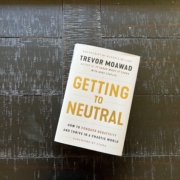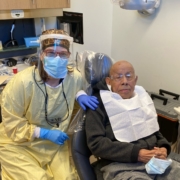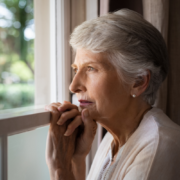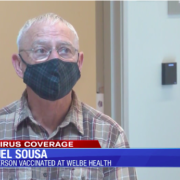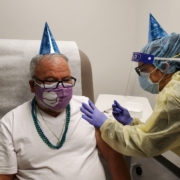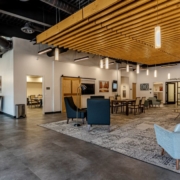WelbeHealth’s Approach to Navigating the Pandemic Saves Lives
COVID-19 Hits the U.S.: Re-Prioritize and Plan
As the reality of the COVID-19 pandemic began to unfold in March of 2020, WelbeHealth’s CEO, Dr. Si France, and the company’s President, Dr. Matt Patterson, grew increasingly concerned. Information about the virus was still incomplete, but it was clear that WelbeHealth’s population of vulnerable seniors was at high risk from COVID-19. The two leaders spent the weekend of March 14 and 15 creating a plan to help ensure that patients (known as “participants”) and employees would survive the next few months. “We knew that we had to act immediately to save lives, and the best way to do that was to downshift to neutral,” says France.
Over the course of the next few days, the company leaders reevaluated their priorities and replaced them with an intentional focus on a neutral mindset and commitment to the things they could control.
A Neutral Mindset Becomes an Important Tool
WelbeHealth’s successful approach to protecting its employees and participants during the pandemic is featured in the recently released book by Trevor Moawad, “Getting to Neutral.” According to Moawad, many people are alive today, because WelbeHealth’s “dedicated staff took the right next step.”
WelbeHealth’s next steps prioritized the safety of their employees, families, and the seniors in WelbeHealth’s Program of All-Inclusive Care for the Elderly (PACE). The organization used the framework of a neutral mindset to navigate the difficult decisions throughout the pandemic: neither being overly optimistic nor falling prey to the trappings of negativity.
Because of WelbeHealth’s neutral approach, leaders were able to respond to the pandemic in a unique way. When pandemic news became overwhelming, the leadership team encouraged team members to manage their intake, and brought just the facts of the pandemic to the staff on a regular basis. This way, the organization could evaluate the changing situation without judgement, and move forward with plans to minimize the impact of the virus on their frail senior population.
France and Patterson led weekly meetings to inform, update, and encourage all employees to adopt a neutral mindset. Staying neutral allowed WelbeHealth employees to focus on what they could control and their 3-part daily checklist:
1. Read the plan of the day.
2. Execute your assignment.
3. Take care of yourself and your family.
Flexibility in Business Model
Because WelbeHealth is led by mission-driven doctors who oversee operations, clinical departments, growth efforts, and more, the team understood what was at stake, and was quick to act when the pandemic arrived. Before the end of March 2020, WelbeHealth became the first PACE organization to launch an emergency response, and shifted to delivering medical care using a home-based model instead of through the facilities. As part of this model, WelbeHealth became the first company of its kind to provide every participant with a mobile tablet device so they could interact with their medical providers, care team, and other program participants.
As soon as vaccines were available, the company became the first, non-hospital-operated PACE to vaccinate its participants as well as team members. The team also partnered with Central Valley and LA counties and volunteered on weekends to organize vaccination clinics and vaccinate 1,900 seniors and frontline workers in WelbeHealth communities.
Knowing that people were one hundred times more likely to die of COVID-19 if they are not vaccinated, the WelbeHealth team went to work educating its participants on the importance of vaccinations. The company mobilized to provide COVID-19 vaccinations to its seniors, reaching a rate of vaccination significantly higher than the population at-large, with over 90% vaccination rate.
Results of Operating from a Neutral Mindset
WelbeHealth’s neutral mindset, flexibility, and focus on vaccinations statistically saved the lives of many of their participants compared to what would normally be seen in this frail population of seniors. With a much lower rate of COVID-19 death rate than skilled nursing facilities, it’s estimated that over 100 seniors are alive today because they enrolled in WelbeHealth’s program. As the pandemic continues, the number of lives saved by the company’s safety measures continues to grow.
France says, “Each Welbe team member plays a part in making the world a more compassionate, loving place. The legacy of WelbeHealth’s work will reverberate for generations. By helping our participants thrive and live longer, they are able to extend their profound influence to their families and communities.”

